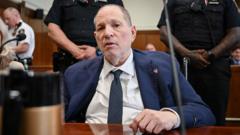The ruling comes amidst tensions within the jury amidst ongoing controversies surrounding Weinstein’s previous convictions and retrial.
**Mistrial Declared in Harvey Weinstein's Rape Charge Trial After Juror Dispute**

**Mistrial Declared in Harvey Weinstein's Rape Charge Trial After Juror Dispute**
A New York judge calls a mistrial after one juror refuses to continue deliberations, leaving a key rape charge unresolved.
A New York judge has officially declared a mistrial regarding a rape charge against Harvey Weinstein following a standoff with a juror who refused to resume deliberations. This development arrived after a six-day discussion on allegations stemming from an incident in 2013 involving actress Jessica Mann. The jury had previously found Weinstein guilty of a single count of sexual assault, while clearing him of another charge, yet the unresolved rape allegation for which the jury was deliberating led to the mistrial announcement.
The current retrial follows an appellate court's decision last year to overturn Weinstein's prior conviction, alleging procedural unfairness during the first trial in 2020. This latest jury comprised seven women and five men and faced several conflicts throughout its deliberations. Tensions escalated to the point where the jury foreperson expressed concerns to the judge about escalating disputes among jurors, which included threats and aggressive remarks, culminating in one juror's refusal to return after claiming fear of retaliation from peers.
Judge Curtis Farber acknowledged that "Sometimes jury deliberations become heated," emphasizing the uniquely charged atmosphere surrounding this case. The retrial involved testimonies from three women who allege that Weinstein exploited his influential position in the entertainment industry to commit acts of sexual abuse. Jurors ultimately found Weinstein guilty of sexually assaulting Miriam Haley, while acquitting him in the case concerning Kaja Sokola. However, the charge involving Jessica Mann ended in mistrial.
Weinstein's recent conviction adds to a lengthy legal saga, as he still faces a 16-year sentence from a previous conviction in Los Angeles for sex crimes. This ongoing series of trials highlights not just the complexities of legal proceedings in high-profile cases, but also the broader implications and societal conversations surrounding the treatment of sexual assault allegations, particularly in the scope of the #MeToo movement.
The current retrial follows an appellate court's decision last year to overturn Weinstein's prior conviction, alleging procedural unfairness during the first trial in 2020. This latest jury comprised seven women and five men and faced several conflicts throughout its deliberations. Tensions escalated to the point where the jury foreperson expressed concerns to the judge about escalating disputes among jurors, which included threats and aggressive remarks, culminating in one juror's refusal to return after claiming fear of retaliation from peers.
Judge Curtis Farber acknowledged that "Sometimes jury deliberations become heated," emphasizing the uniquely charged atmosphere surrounding this case. The retrial involved testimonies from three women who allege that Weinstein exploited his influential position in the entertainment industry to commit acts of sexual abuse. Jurors ultimately found Weinstein guilty of sexually assaulting Miriam Haley, while acquitting him in the case concerning Kaja Sokola. However, the charge involving Jessica Mann ended in mistrial.
Weinstein's recent conviction adds to a lengthy legal saga, as he still faces a 16-year sentence from a previous conviction in Los Angeles for sex crimes. This ongoing series of trials highlights not just the complexities of legal proceedings in high-profile cases, but also the broader implications and societal conversations surrounding the treatment of sexual assault allegations, particularly in the scope of the #MeToo movement.

















